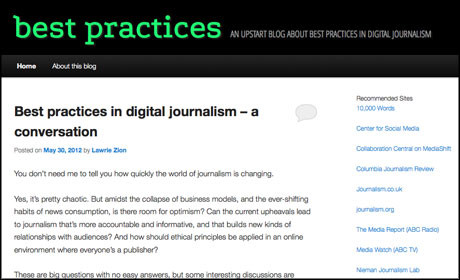
Best Practices hopes to explore questions such as 'are some mistakes so trivial you shouldn't flag them up as a correction?'
A new blog has launched "to track emerging best practices in digital journalism", discussing what journalists should do when faced with decisions over corrections and other issues.
Best Practices has been launched by an academic in Australia "intrigued by how traditional ethical principles such as accuracy and transparency might best be realised in a rapidly changing mediascape".
Announcing the launch of the blog, Lawrie Zion, associate professor of journalism at La Trobe University and editor-in-chief of Upstart, where the blog is located, states: "Across different contintents, attempts to grapple with how to identify and foster emerging best practices in digital journalism are opening up conversations about ethics and excellence."
He continues: "The mission of this blog is to draw attention to these initiatives and to contribute, with your input, to the conversation about how journalism can be renewed."
Zion became interested in the topic after he could not answer a question asked by one of his students about whether it was correct to use a particular YouTube video (see the question here).
He has researched the topic, presenting a paper at the International Symposium on Online Journalism (ISOJ) conference held in Austin, Texas last month.
Speaking to Journalism.co.uk, Zion said he hopes the new blog will be a "framing device for journalism ethics as to what's the best way to do something".
"Excellence and ethics are really part of the same thing in journalism and 'best practice' is a term that permeates across the spectrum."
He said the best example of best practice in action is Craig Silverman's Regret the Error blog, which is now on Poynter.
Zion is hoping technology can help provide solutions such as ways to correct a mistake that "has more meaning to the people who might be affected by it in the first place".
Digital journalism also poses new questions, Zion said, such as "are some mistakes so trivial that you shouldn't really worry about making a fuss about correcting them and instead just go and do them?" The next question is then "where do you draw the line?"
Zion is also interested in how you encourage corrections, promoting "greater trust and greater collaboration" between journalists and readers.
He suspects many journalists do not understand copyright law and are not "taking advantages of the principles of fair use", an issue discussed in this Center for Social Media study. Zion fears some digital journalists shy away from "referencing other people's work in a digital space" as they are "too intimidated as to what might go wrong".
- Craig Silverman will be speaking on the topic on "best practices" in digital journalism at news:rewired - full stream ahead conference on 13 July. See the agenda for more details and for tickets.
- To learn more about copyright attend our one-day 'online media law' course (just three spaces left).
Free daily newsletter
If you like our news and feature articles, you can sign up to receive our free daily (Mon-Fri) email newsletter (mobile friendly).









